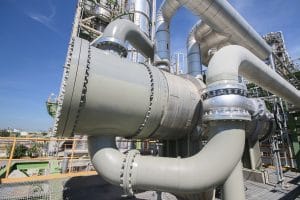 Most industries rely on similar types of technology, even if the specific applications for that technology can differ greatly. For example, automated technology can come in the form of software that streamlines a company’s administrative processes, or large equipment that makes up entire manufacturing assembly lines. Much like automation, most other forms of technology can be customized and applied as needed, but will always come with several consistent considerations for the companies that implement them. One of the most common of those considerations – and, also, one of the most impactful – is electrical thermal management, which heat exchangers can often address with optimal efficiency and reliability.
Most industries rely on similar types of technology, even if the specific applications for that technology can differ greatly. For example, automated technology can come in the form of software that streamlines a company’s administrative processes, or large equipment that makes up entire manufacturing assembly lines. Much like automation, most other forms of technology can be customized and applied as needed, but will always come with several consistent considerations for the companies that implement them. One of the most common of those considerations – and, also, one of the most impactful – is electrical thermal management, which heat exchangers can often address with optimal efficiency and reliability.
Typical thermal management concerns
Whether automated or not, industry-scale technology often includes several electrical enclosures that have to be properly cooled on a consistent basis (often, 24/7). The more a company relies on its technology, the higher an impact its electrical thermal management solution will have on the company’s overhead and overall operations. Heat exchangers have long been the preferred method of cooling electrical enclosures because their innovative heat transfer methods help significantly lower that impact. Even control panels and other enclosures within high-performance applications, or that operate within extremely hot temperatures, can benefit from below-ambient cooling with specialized heat exchangers instead of more costly and problematic solutions such as air conditioners.
Industry-specific applications
While cooling electrical enclosures is something that almost all forms of technology require, it isn’t the only thermal management challenge that heat exchangers help companies overcome. In many instances, they can meet highly specific industry needs with just as much efficiency, reliability, and effectiveness as they do common thermal management needs. For example, increasingly more industries are relying on wastewater treatment processes as part of their eco-friendly efforts. Others, such as food and beverage manufacturing, rely on consistent thermal management to process their products and ensure their safety. In these and many other applicable systems, heat exchangers have been a proven advantage to the companies that utilize them.
The wide range of heat exchanger benefits
The fact that they can fit such a wide variety of applications is only one reason why heat exchangers are applicable for virtually every industry. The other is their innovative use of natural processes, such as phase-change cooling, to transfer electrical waste heat without requiring complicated machinery or large amounts of energy. Where traditional solutions aimed to overwhelm waste heat with chilled air, heat exchangers prevent it from accumulating by transferring and dissipating the heat. Compared to other solutions, this presents a wide range of advantages, including significantly lower energy usage, a notably longer lifespan with minimal maintenance, and a smaller environmental footprint overall.
For more information about how heat exchangers can be adapted to fit nearly any industry, call Noren Thermal Solutions in Taylor, TX, at 866-936-6736.







